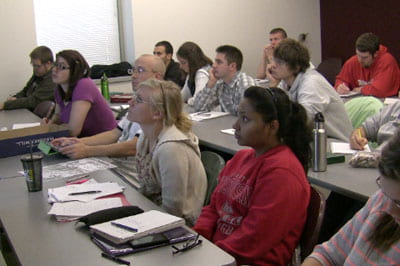 When UW-Green Bay Associate Prof. John Katers had his Industrial Pollution Control students introduce themselves earlier this semester, Marina Hauser got a pleasant surprise.
When UW-Green Bay Associate Prof. John Katers had his Industrial Pollution Control students introduce themselves earlier this semester, Marina Hauser got a pleasant surprise.
“It was really exciting when we realized we were four international students in one class,” said Hauser, who hails from Switzerland. “We went around to introduced ourselves and it was like, ‘Oh, Kenya! Oh, Germany! Oh, Spain!’ … And now we hang out a lot.”
Hang out a lot — and learn from one another, too, Katers said.
[youtube id= hyOy0Vt7f7c width= 400 height= 300]
“The Industrial Pollution Class this year is fairly unique because we’ve got essentially four international students — one from Germany, one from Switzerland one from Spain and one from Kenya,” Katers said. “And along with that we also had a visiting instructor from Chile. So with that group we essentially had four continents represented, which was very interesting.”
On a recent afternoon after class, the students took time to introduce themselves and discuss their experience.
“I’m Marina Hauser; I’m from Switzerland. I study Environmental Science and I’m here for four years,” Hauser said, flanked by her fellow students.
“I’m Michael Hannemann. I’m from Germany — Frankfurt — and I’m studying Environmental Sciences and Policy, my graduate program,” added her new friend.
‘I’m Rodrigo Canibano, I’m from Spain and I’m studying in Leon,” Canibano said. Like Hannemann, he’d arrived at UW-Green Bay at the beginning of the academic year.
“Hi I’m Sravani Karnam; I’m an international student from Kenya, and I’m studying environmental science and chemistry,” said Karnam, the final student to introduce herself. Also present was Prof. Alex Godoy, who’d just wrapped up a lecture for the class.
“I am visiting professor from Chile; this is my second time here,” Godoy said. “I was visiting scholar one year ago … and now I’m so happy to be teaching here in Environmental Science and in Humanistic Studies.”
UW-Green Bay offers great opportunities for international students, Katers said.
“That’s always one of the questions I like to ask the students, is ‘why did you come to Green Bay?’ ” he said. “And again I think we do have a very strong environmental reputation, both on the ecological side and also on the physical sciences side, as well, which would include pollution and water quality and those types of issues. So I think that really is a draw.”
That’s certainly the case for Karnam, who said she’s learning a lot and benefiting from multiple perspectives.
“This class has focused a lot on industrial aspects of pollution control,” she said. “It’s given us hands-on experience about how every industry works in Green Bay. The regulations in the U.S. (are) very different than in a developing country like Kenya.”
Hannemann agreed, adding that his field of study benefits greatly from multiple perspectives.
”I think Environmental Science is an international issue, or international behavior,” he said. “So I think it’s good that all the international people are here, also in the U.S. to hear about the environmental programs or environmental issues in a class like Pollution Control is.”
Or, as Godoy put it, simply and effectively:
“When you can share the class with people from around the world, you can open your mind.”
(This text closely approximates the embedded video’s audio content, including narration and interviews, and may include additional detail.)

